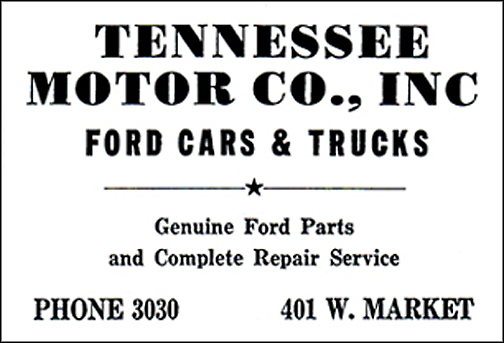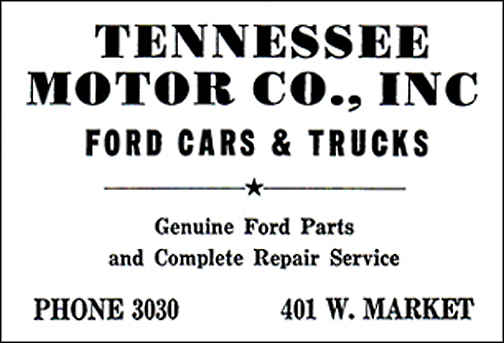My Tennessee Silk Mill column prompted Geneva Feathers to send me a letter concerning a comment I made in it. I indicated that the milling operation once increased its production capability after expanding to property along its east side.

Mrs. Feathers fondly recalled working at that site: “I want to add to Mrs. Rader’s memories – not about Leon-Ferenbach, though the company did have an impact on my life indirectly. “While I don’t remember the Livery Stable you mentioned, I recall that Tennessee Motors, the local Ford dealership, was once located between the silk mill and the Fire Hall.” A 1937 city directory authenticates Geneva’s memory; the main lot was at 232-234 W. Market next to the fire station. The used car lot was directly across the street.
Geneva said that her father, Dave Duncan, bought his first car, a Ford, in Erwin in 1917. She continued: “I went to work at Tennessee Motors in the office around January 1940. Gates Kidd was owner and Sherwood Hindley was office manager.”
Mrs. Feathers related the dramatic almost overnight changes to the automobile business that occurred after the Dec. 7, 1941 attack on Pearl Harbor: “After (the war) started, sales of cars to the public were frozen. We had nine cars in inventory then and they were slowly sold to those people who met the Rationing Board’s certificate of need. “I believe the last car was sold to Miss Margaret Hayes and her sister. They lived on Knob Creek Road, which then was considered to be far out in the country. “These ladies were able to get a certificate because they needed a car to carry out critical farm work for the war effort. They came by and purchased an aqua colored coupe for $900. There was no sales tax then.”
Geneva further commented how the war impacted her personally: “Tennessee Motors continued to repair cars and do some body work, but there wasn’t enough work to keep all of us busy. Being the newest member of the office staff, I was the first to be laid off. I worked in the office of Johnson City Steam Laundry for three to four months until I had an opportunity to go to Tennessee Eastman Company’s Accounting Department. After several months, Mr. Hindley left Tennessee Motors and I was offered the position of Office Manager, which made me very happy.I no longer had to spend long hours commuting over the congested two-lane highway to and from Kingsport. When Leon-Ferenbach bought our building so they could expand, Tennessee Motors moved to 415 W. Market. The body shop was eliminated then and efforts were confined to keeping cars and a few trucks. After the war, the dealership once again operated in a new building at 401 W. Market. I left the business shortly before they moved to this new building.”
Geneva concluded her letter with some remembrances of the Fire Department next door. “There was a small white short-haired dog with black markings on its ears that lived there. I believe he belonged to Fire Chief George Wilson. This was about four years after ‘Boss,’ the city mascot, died. As trucks were being prepared to go to a fire, the dog ran out onto the front sidewalk and charged back and forth, barking furiously to stop pedestrian traffic so the trucks would not be detained in any way.”
It is nice to hear from people like Geneva Feathers, who lived and breathed some of Johnson City’s diverse colorful history.

Comments are closed.